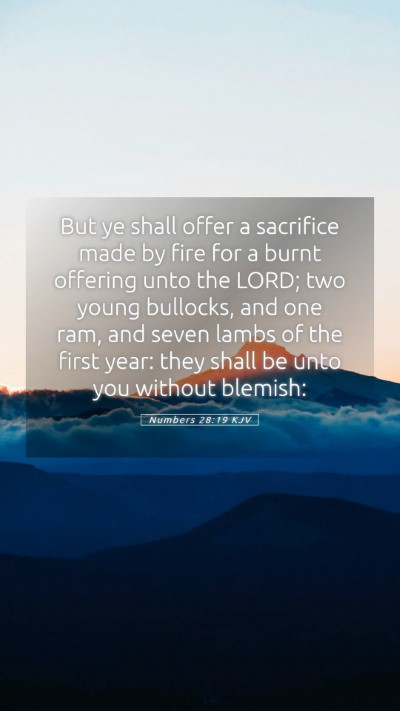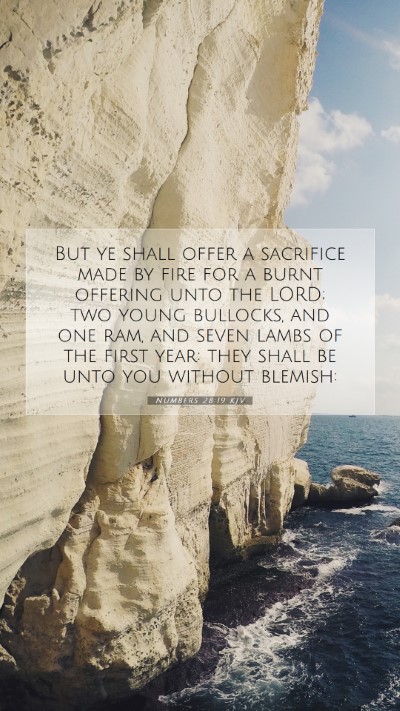Understanding Numbers 28:19
In this analysis, we delve into the meaning and significance of Numbers 28:19 through insights drawn from esteemed public domain commentaries, including those by Matthew Henry, Albert Barnes, and Adam Clarke. This verse is part of the detailed instructions given to the Israelites regarding their offerings and sacrifices, specifically focusing on the guidelines for the offerings made during the sacred festivals.
Text of Numbers 28:19
“But ye shall offer a sacrifice made by fire, for a burnt offering, unto the Lord; two young bullocks, and one ram, and seven lambs of the first year; they shall be unto you without blemish.”
Verse Meaning and Interpretation
This verse underscores the importance of presenting offerings that are unblemished and acceptable to the Lord, symbolic of the purity and holiness that ought to be reflected in acts of worship. Here, we will explore the various dimensions of understanding this scripture:
1. The Concept of Sacrifice
According to Matthew Henry, the sacrificial system set forth in the Old Testament not only foreshadowed the ultimate sacrifice of Christ but also served to maintain a genuine relationship between God and His people. The act of sacrifice signifies surrender and devotion, demanding that one offers their best to God.
2. Types of Offerings
Albert Barnes highlights the different categories of offerings, stressing that each offering has its unique purpose and significance. In this context, the burnt offerings (two young bullocks, one ram, and seven lambs) symbolize complete submission to God's will, demonstrating a holistic approach to worship and devotion during significant feasts.
3. The Symbolism of 'Without Blemish'
The requirement that the animals be 'without blemish' as noted by Adam Clarke represents the need for purity in sacrifices. It teaches that our approach to God must come from a place of holiness, reflecting the ultimate sacrifice of Christ, who was without sin. This principle is crucial in understanding the deeper theological implications of sacrifice in the Christian faith.
4. Celebrating God’s Faithfulness
Numbers 28:19 is part of a larger narrative revolving around the experience of the Israelite's journey and agricultural practices. Commentators urge that these sacrifices were moments to celebrate God's sustaining grace and faithfulness, marking the Jewish feasts observed as communal acts of gratitude and remembrance.
5. Applicability in Modern Worship
In modern contexts, the interpretation of this verse extends beyond mere ritual. It prompts believers to consider how they can 'offer' their lives in service, their gifts, and acts of worship to God in a manner that reflects the essence of what true sacrifice means.
Related Biblical Cross References
- Leviticus 1:3 - Instructions concerning burnt offerings.
- Exodus 12:5 - Requirement for a lamb without blemish during Passover.
- Romans 12:1 - Call to present our bodies as living sacrifices.
- Hebrews 9:14 - Christ’s sacrifice that purifies the conscience.
- 1 Peter 1:19 - The precious blood of Christ as a lamb without spot.
Conclusion
The exploration of Numbers 28:19 reveals the multifaceted nature of sacrifice within biblical context and its relevance to modern believers. Through the lenses of Biblical exegesis, Bible verse explanations, and the teachings of notable commentaries, we grasp a richer understanding of Bible verse meanings that elevate the act of worship beyond ritual into a heartfelt response to God's overwhelming goodness.
Further Study Resources
- Engage in bible study groups to deepen your understanding.
- Access bible study tools to assist in personal research.
- Participate in online bible study for broader perspectives.
- Utilize bible study guides for structured learning.


